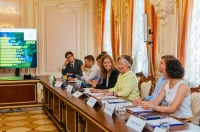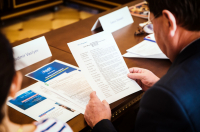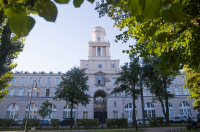Established in 2014, the International Council has since become the powerhouse of ITMO’s strategic framework, all thanks to its expert members providing the University with insightful advice on enhancing its competitive performance on the international higher education scene. Comprised of leading scientists and scholars, the Council convenes twice a year to talk all things progress and development.
Following up on the last meeting, which took place in St. Petersburg this April and focused on the University’s ecosystem, the 9th International Council meeting was held in Amsterdam, city of bikes and home to two council members: Dr. Peter Sloot, University of Amsterdam, NTU and ITMO University professor, as well as Dr. Sijbolt Noorda, President emeritus of the University of Amsterdam, past president of the Association of Dutch Research Universities and a former board member of the European University Association.

Keeping to the tradition, the formal gathering was prefaced with a pre-meeting, which was this year aimed at introducing the ITMO delegation to the forward-thinking educational and research center that is the University of Amsterdam (UvA). The tour started with Prof. Sloot’s own office with its windows onlooking to the autumnal streets of the bustling Dutch capital. The council members were greeted by the UvA’s President Geert ten Dam, who gave a comprehensive overview of the university and its activities.
Dr. ten Dam’s introductory talk was followed with a presentation by Lucy Wenting, the Director of the Institute for Interdisciplinary Studies, in which she expanded on the Institute’s innovative approach to education, as exemplified by its cutting-edge Bachelor’s and Master’s programs which draw on several scientific fields to provide students with new perspectives and working tools, and science with the next generation of versatile specialists able to solve complex global tasks of the day.

The next UvA representative taking the floor was Dr. Peter Sloot himself. Prof. Sloot dedicated his presentation to the workings of the UvA’s Institute for Advanced Study, of which he is the Director. Much as the Institute for Interdisciplinary Studies, Prof. Sloot’s department explores the up-and-coming scientific trend of interdisciplinarity, with the only difference being that the Institute for Advanced Study’s main focus is on collaborative research, bringing scientists from different fields together to conduct cutting-edge research on urgent scientific and social issues.

The tour continued with a visit to the University of Amsterdam’s state-of-the-art Science Park, a trailblazing research-and-education space that served as inspiration for ITMO University’s HighPark campus. The delegation was welcomed by Peter van Tienderen, Dean of the UvA’s Faculty of Science, who introduced them to the facility, and Florian Schreck, who showed the visitors round the Institute of Physics Lab. The group then moved on to explore the Startup Village, an avant-garde business incubator which functions on the grounds of Science Park and consists of in-built shipping containers which act as coworking spaces for budding entrepreneurs.

This jam-packed pre-meeting day laid the grounds for the main council meeting, which took place on November 4. All International Council members gathered at the UvA’s Institute for Advanced Study to discuss two crucial topics: ITMO University’s academic environment and ITMO HighPark.
After a word of welcome by the International Council’s Chair Prof. Debra Stewart, the first speaker to address the assembly was ITMO University Rector Vladimir Vasilyev, who updated the council members on the University’s progress and latest developments in the field of Russian higher education. ITMO's First Vice Rector, Daria Kozlova then shared about the development of the University’s academic environment. The main point of focus here were the individual educational tracks, an innovation also discussed during the International Council’s 7th meeting in Tucson, Arizona. The council members exchanged their views on the best ways to give students agency, or learning autonomy, and touched on the topic of electives and how they can be used to help students design their individual educational tracks. Another keynote was the issue of double majors; the members considered what these would look like at ITMO University, which double-major format is best, and at what stage they should be offered to students to benefit them in their studies.
“The meeting of the International Council was extremely fruitful both for the University and the members of the Council. It provides the members with a chance to hear and see what problems ITMO is attempting to tackle and how they are attempting to tackle them, and it gives the University the possibility of hearing experiences from multiple international higher education systems about how such issues have been and are being handled elsewhere. It is a great dialogue and it will certainly allow the Rector and his team to make more informed and better decisions regarding the direction of ITMO,” commented Andrew Wachtel, Narxoz University Rector and member of the International Council.

"When people in the US ask me questions like what's with ITMO University and why spend time on these meetings, I respond that to me, ITMO is absolutely unique and maybe the most exciting university on the planet and the fastest innovating university I know, so it's fascinating to be part of this process. Also, because I come from an established institution, I learn a lot about how to be so adaptive because our institutions are much slower in their development. ITMO University moved from a classic kind of old-structure university to something very cutting edge, very new, very current, in just 20-30 years, which is extremely fast in university-time,” shared Andrew Comrie, Professor of School of Geography & Development at the University of Arizona and member of ITMO University’s International Council. “And you can take a little bit of pride every time we meet to see how well ITMO is doing. It's completely remarkable."
The second part of the formal meeting was dedicated to ITMO University’s HighPark. The participants deliberated over the use of HighPark’s spaces and the rhythm of life on the campus, weighing up on how to encourage interaction amongst students from different disciplines and also with those industries that will be around. The important concern of advancing interdisciplinarity in general was a topic of much discussion, with the council members unanimously agreeing on the value of interdisciplinary initiatives like Art & Science, an ultra-modern Master’s program that has just started at ITMO University. They also mooted the role of having a business incubator at the University.

"On November 4 the ITMO International Council wrapped up its 9th council meeting. Council members were uniformly impressed by the progress ITMO University continues to make as it strives for excellence in research, teaching and outreach. ITMO’s highly innovative approach to organizing its work is yielding significant benefits. It is especially notable that ITMO, while continuing to meet all of the established metrics for success, never loses sight of its mission: to produce the highest quality research and to inspire and educate students to meet the global challenges," explained Debra Stewart, Chairperson of the International Council.





